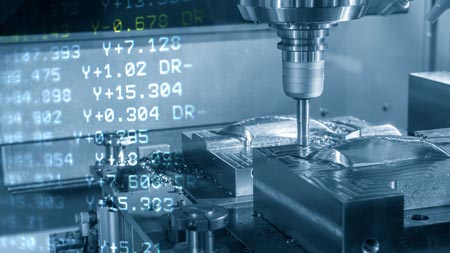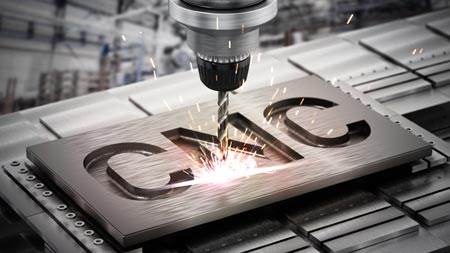CNC Machining


CNC machining (Computer Numerical Control) is a modern technology widely used for precision machining of both metal and non-metal materials. CNC, which stands for "Computer Numerical Control," automates the movements of machine tools through pre-programmed instructions, enabling precise and efficient manufacturing processes. Compared to traditional manual machining, CNC machining offers significant advantages in terms of precision, efficiency, stability, and repeatability, making it an indispensable technology in modern manufacturing.
Working Principle of CNC Machining
The core of CNC machining lies in controlling the movement of cutting tools through CNC machines, which perform operations such as cutting, drilling, and milling on the workpiece. Using CAD/CAM software, a 3D model is converted into machining instructions. The machine then follows these instructions to move the tools precisely, removing excess material to form the desired shape and structure. This fully automated process reduces manual errors and significantly enhances machining efficiency.
Advantages of CNC Machining
• High Precision and Consistency:
CNC machining can achieve micron-level precision, which is crucial for manufacturing high-demand precision parts. Whether for single-piece production or batch manufacturing, CNC machining ensures that every workpiece meets design specifications with a high level of consistency. This makes it especially suitable for industries such as aerospace, automotive, and medical equipment.
• Multi-Axis Movement for Complex Structures:
Modern CNC machines support multi-axis movement, such as CNC five-axis and CNC four-axis machining, allowing simultaneous operations in multiple directions. This advancement makes it more efficient to machine complex shapes, surfaces, and irregular parts, reducing the time needed for re-clamping and positioning. It's ideal for automotive components, molds, and precision machinery.
• Automation and High Production Efficiency:
CNC machining enables fully automated production, from programming to execution, requiring minimal human intervention. CNC machines can quickly produce large quantities of precision parts, significantly reducing production cycles while maintaining high-quality standards, which is ideal for large-scale production. This efficiency and stability offer companies substantial cost benefits.
• Material Versatility:
CNC machining can process various metal materials, such as steel, aluminum, stainless steel, and titanium alloys, as well as non-metal materials like plastic, wood, and composites. This material diversity makes CNC machining widely applicable across industries, including automotive, aerospace, electronics, and consumer goods.
• Shortened Product Development Cycles:
CNC machining’s quick response and flexibility are particularly suitable for prototype production and small-batch trials during product development. Designers can quickly turn CAD designs into physical models, allowing for multiple design iterations and sample testing in a short time, significantly shortening the product development cycle.
Applications of CNC Machining
• Aerospace:
CNC machining is widely used in the manufacturing of aircraft components such as wings, engine parts, and structural components, where strict weight and strength requirements are met with high precision.
• Automotive:
In automotive manufacturing, CNC machining plays a crucial role in producing engine parts, transmissions, and chassis, ensuring consistent performance under high temperature and pressure conditions while meeting mass production needs.
• Medical Devices:
The manufacturing of medical devices requires extreme precision and safety. CNC machining can accurately produce surgical instruments, implants, and other medical equipment parts, demonstrating unmatched technical advantages for complex medical device structures.
• Electronics:
In the electronics industry, CNC machining is used to manufacture parts like casings, brackets, and heat sinks, where strict dimensional requirements are essential. CNC machining ensures stability and precision for these components.
As Industry 4.0 advances, CNC machining technology will continue to develop toward greater intelligence and automation. Artificial intelligence (AI) and machine learning will further optimize CNC systems, enabling self-learning and self-adjustment capabilities to improve machining efficiency and precision. Additionally, as new materials and composites emerge, CNC machining will expand its application fields in material usage.
CNC machining is a critical technology in modern manufacturing, offering high precision, efficiency, and versatility to meet the diverse needs of various industries. Whether for small-batch custom production or large-scale automated manufacturing, CNC machining delivers higher precision, shorter production cycles, and cost-effective solutions. Wei Sheng Industrial specializes in advanced CNC machining and laser cutting technologies, providing precision metal processing services to industries such as automotive, electronics, construction, and medical. Equipped with state-of-the-art CNC machining and laser cutting machines, we can accurately handle complex designs and customize metal products and precision structures based on customer needs. Our services also cover sheet metal fabrication, frame welding, CNC gantry milling, and automated equipment assembly, ensuring that every project meets the highest quality and precision standards, making us your reliable one-stop partner in metal processing.